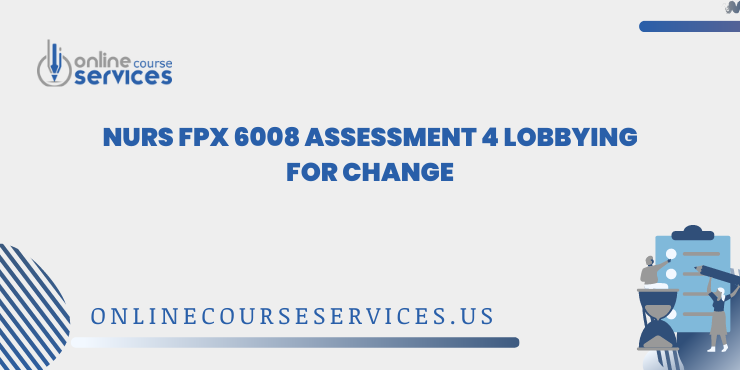
NURS FPX 6008 Assessment 4: Lobbying for Change
Mayor XYZ
ADDRESS
COUNTRY
Dear Mr XYZ
I am writing to bring attention to the pressing issue of inequitable access to mental health care services within our community. As a master’s-level health care practitioner, I have witnessed firsthand this issue’s devastating impact on our constituents. Currently, many individuals, particularly those from marginalized and underserved populations, face significant barriers to accessing mental health care, including financial constraints, limited provider availability, and stigma (Mongelli et al., 2020). NURS FPX 6008 Assessment 4, These barriers result in untreated mental illness, leading to exacerbated conditions, increased substance abuse rates, and higher incidences of homelessness and involvement with the criminal justice system.
Failure to address this issue will have dire consequences for our constituents. Without adequate access to mental health care services, individuals will continue to suffer needlessly, resulting in a decline in overall well-being and quality of life (Coombs et al., 2021). Furthermore, the economic costs associated with untreated mental illness, such as lost productivity and increased healthcare expenditures, will only continue to escalate.
NURS FPX 6008 Assessment 4 Lobbying for Change
Addressing this issue is crucial for the well-being of our community. We can expect several positive outcomes by ensuring equitable access to mental health care services. Improved mental health outcomes among individuals will lead to a healthier and more productive workforce, contributing to the economic vitality of our community (de Oliveira et al., 2022). Additionally, reducing the burden of untreated mental illness can alleviate strain on our healthcare system and decrease costs associated with emergency room visits and hospitalizations.
Informed by my personal, professional, and organizational experiences, I have taken a strategic approach to resource planning and risk analysis in addressing this economic issue. One such experience that illustrates this approach is when I encountered a patient who struggled to access mental health care due to financial constraints (Ryu & Fan, 2022). By analyzing available resources and potential risks, I collaborated with community organizations to provide low-cost mental health services, ultimately improving the patient’s well-being and reducing long-term healthcare costs.
To support my advocacy, I have gathered key information from scholarly sources highlighting the importance of equitable access to mental health care services and its impact on individual and community health outcomes. For instance, a study published in the Journal of Health Economics found that investing in mental health services yields a return of $4 for every $1 spent, demonstrating the cost-effectiveness of addressing this issue (Le et al., 2021). Furthermore, I have ensured that recommendations for proposed changes are grounded in ethical, cultural, and diversity principles to ensure inclusivity and accessibility for all community members.
NURS FPX 6008 Assessment 4 Lobbying for Change
Please consider the importance of equitable access to mental health care services and take action to address the disparities that exist within our community. NURS FPX 6008 Assessment 4, Investing in mental health care can promote a healthier, more resilient community for generations to come.
Thank you for your attention to this matter. I look forward to your support and leadership in addressing this critical issue.
Sincerely,
[Your Name]
Sincerely,
References
Coombs, N. C., Meriwether, W. E., Caringi, J., & Newcomer, S. R. (2021). Barriers to healthcare access among U.S. adults with mental health challenges: A population-based study. SSM – Population Health, 15(PMC8214217).
https://doi.org/10.1016/j.ssmph.2021.100847
de Oliveira, C., Saka, M., Bone, L., & Jacobs, R. (2022). The role of mental health on workplace productivity: A critical review of the literature. Applied Health Economics and Health Policy, 21(2).
https://doi.org/10.1007/s40258-022-00761-w
Le, L. K.-D., Esturas, A. C., Mihalopoulos, C., Chiotelis, O., Bucholc, J., Chatterton, M. L., & Engel, L. (2021). Cost-effectiveness evidence of mental health prevention and promotion interventions: A systematic review of economic evaluations. PLOS Medicine, 18(5), e1003606.
https://doi.org/10.1371/journal.pmed.1003606
Mongelli, F., Georgakopoulos, P., & Pato, M. T. (2020). Challenges and opportunities to meet the mental health needs of underserved and disenfranchised populations in the United states. Focus, 18(1), 16–24.
https://doi.org/10.1176/appi.focus.20190028
Ryu, S., & Fan, L. (2022). The relationship between financial worries and psychological distress among U.S. adults. Journal of Family and Economic Issues, 44(1), 16–33.
https://doi.org/10.1007/s10834-022-09820-9
Tag: Topic Approval Form